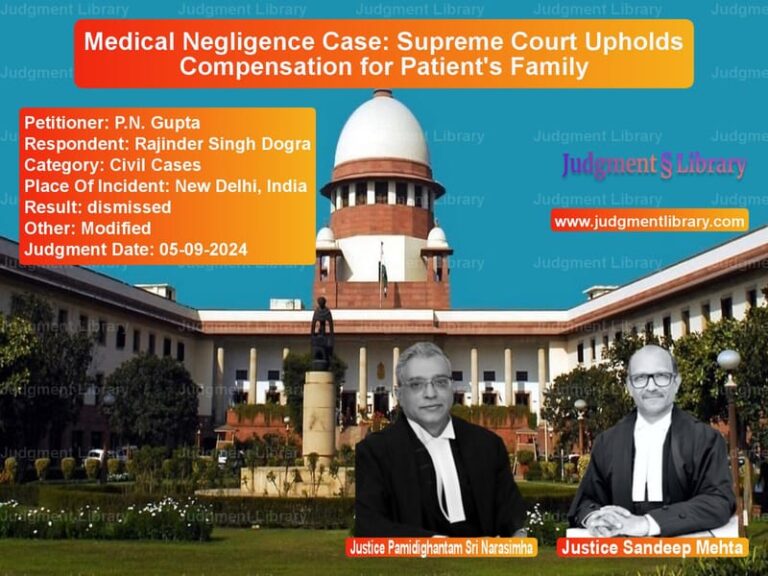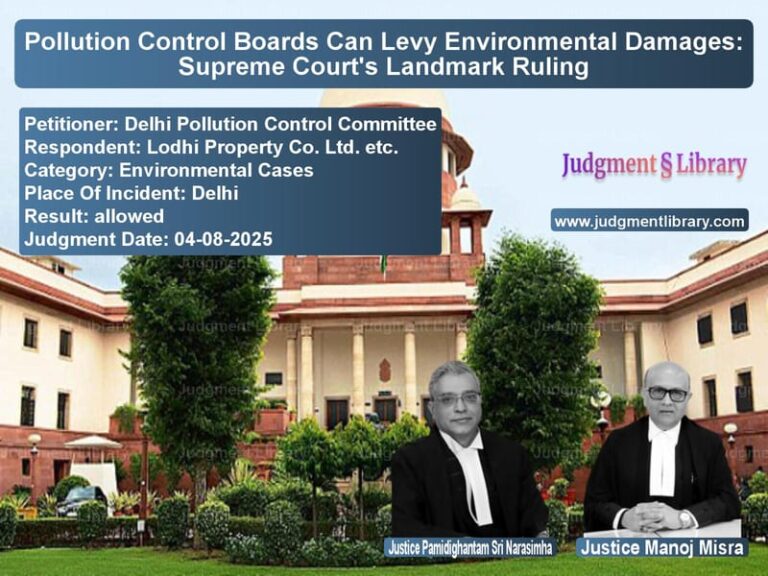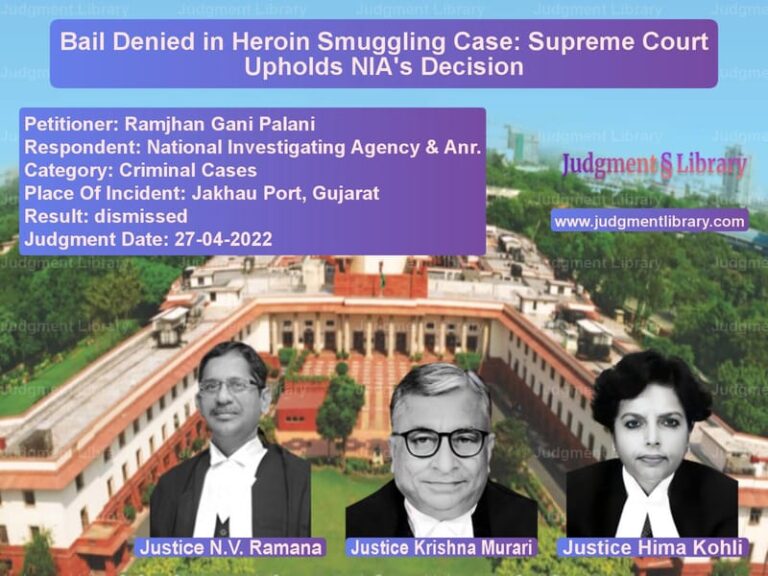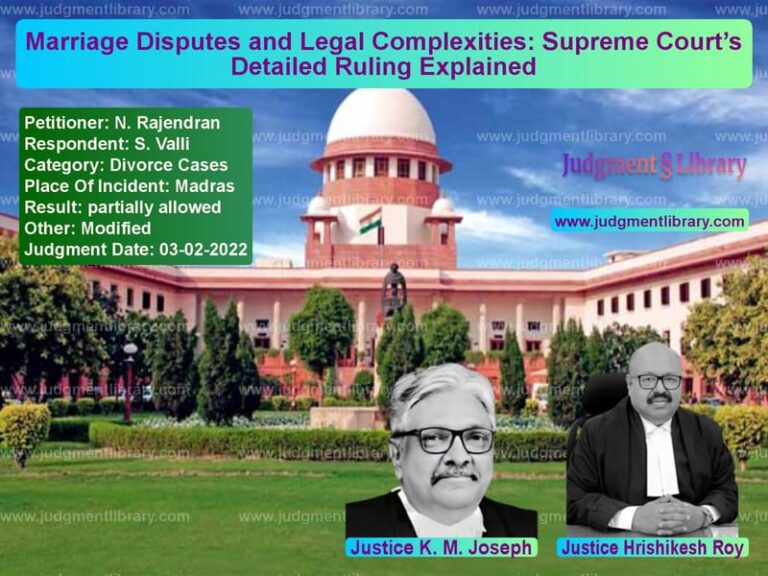Supreme Court Upholds Appointment of Acquitted Candidate in CISF
The Supreme Court of India recently ruled in favor of Ramesh Bishnoi, directing the Central Industrial Security Force (CISF) to reinstate his appointment after he was initially denied the post of Sub-Inspector due to a past criminal case. The case raises important legal questions about the employment rights of individuals who have been acquitted and the application of the Juvenile Justice Act.
Background of the Case
Ramesh Bishnoi had applied for the post of Sub-Inspector in CISF after clearing the required examinations and physical endurance test conducted by the Staff Selection Commission (SSC). However, upon verification of his background, it was discovered that an FIR had been registered against him in 2009 under Sections 354, 447, and 509 of the Indian Penal Code (IPC). These charges pertained to an incident where Bishnoi, as a minor, was accused of teasing a girl and catching hold of her hand.
Despite his acquittal in 2011 due to lack of evidence and a compromise between the parties, the CISF’s Standing Screening Committee found him unsuitable for appointment. Consequently, his selection was canceled on June 3, 2017.
Legal Proceedings
Bishnoi challenged the cancellation of his appointment before the Rajasthan High Court, which ruled in his favor. The CISF was directed to reconsider his case in light of the Supreme Court’s judgment in Avtar Singh v. Union of India (2016) 8 SCC 471. However, upon reconsideration, the CISF again rejected his candidature on January 16, 2018, citing the seriousness of the charges, even though he had been acquitted.
Following this, Bishnoi approached the High Court again. The Single Judge ruled in his favor on March 8, 2018, directing CISF to reinstate his appointment within 30 days. The CISF appealed this decision before the Division Bench of the Rajasthan High Court, which upheld the Single Judge’s ruling on May 8, 2018. Dissatisfied with this, the Union of India and CISF approached the Supreme Court.
Arguments by the Petitioner (Union of India)
The Union of India contended that the mere acquittal of the respondent did not entitle him to employment in the security forces. They argued that:
- The charges against Bishnoi were of a serious nature and fell under the category of moral turpitude.
- His acquittal was based on a compromise rather than an assessment of innocence.
- The Standing Screening Committee had the discretion to assess suitability beyond mere acquittal.
- As per government guidelines, individuals with criminal backgrounds, even if acquitted, could be denied appointment in disciplined forces.
Arguments by the Respondent (Ramesh Bishnoi)
Bishnoi’s legal counsel countered these claims, stating that:
- He was a minor at the time of the alleged incident, and the Juvenile Justice Act ensures that juveniles should not face lifelong consequences for their actions.
- His acquittal was not due to any technicality but because no evidence was brought against him.
- He had fully disclosed his past case in the recruitment form, proving he had not concealed any material facts.
- Once acquitted, a candidate should not be treated as guilty for the purpose of employment.
Supreme Court’s Verdict
The Supreme Court, in a judgment delivered by Justices Uday Umesh Lalit and Vineet Saran, ruled in favor of Bishnoi. The Court held that:
- The respondent was a minor at the time of the incident, and the Juvenile Justice Act prioritizes the reintegration of juveniles into society without stigma.
- Section 3(xiv) of the Juvenile Justice Act states that all past records of a child under the juvenile justice system should be erased, except in special circumstances.
- The alleged offense did not fall under the category of serious crimes involving moral turpitude.
- Since the respondent had disclosed his past case and was acquitted, the rejection of his appointment was unjustified.
Thus, the Supreme Court dismissed the appeal and upheld the High Court’s order directing CISF to appoint Bishnoi within 30 days.
Implications of the Judgment
This ruling is significant for several reasons:
- It reinforces the principle that juveniles should not suffer lifelong consequences for acts committed in their youth.
- It clarifies that an acquittal, particularly one due to lack of evidence, should not be treated as a bar to government employment.
- It sets a precedent for cases where government agencies deny employment based on past allegations, ensuring that each case is assessed fairly.
Conclusion
The Supreme Court’s decision in favor of Ramesh Bishnoi underscores the importance of the rehabilitation of juveniles and the presumption of innocence following an acquittal. It serves as a reminder that legal systems should be based on fairness and not arbitrary discretion, ensuring that individuals are not denied opportunities based on unproven allegations from their past.
Petitioner Name: Union of India.Respondent Name: Ramesh Bishnoi.Judgment By: Justice Uday Umesh Lalit, Justice Vineet Saran.Place Of Incident: Rajasthan.Judgment Date: 29-11-2019.
Don’t miss out on the full details! Download the complete judgment in PDF format below and gain valuable insights instantly!
Download Judgment: Union of India vs Ramesh Bishnoi Supreme Court of India Judgment Dated 29-11-2019.pdf
Direct Downlaod Judgment: Direct downlaod this Judgment
See all petitions in Recruitment Policies
See all petitions in Employment Disputes
See all petitions in Public Sector Employees
See all petitions in Judgment by Uday Umesh Lalit
See all petitions in Judgment by Vineet Saran
See all petitions in dismissed
See all petitions in supreme court of India judgments November 2019
See all petitions in 2019 judgments
See all posts in Service Matters Category
See all allowed petitions in Service Matters Category
See all Dismissed petitions in Service Matters Category
See all partially allowed petitions in Service Matters Category







